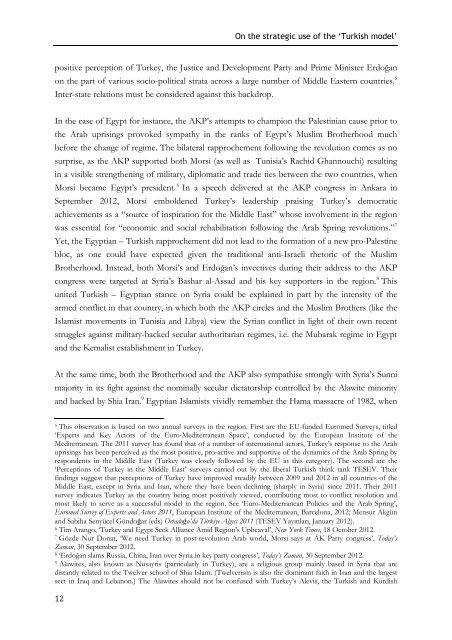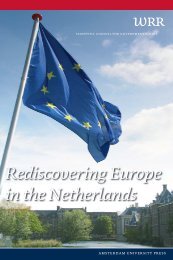The Western Condition - St Antony's College - University of Oxford
The Western Condition - St Antony's College - University of Oxford
The Western Condition - St Antony's College - University of Oxford
Create successful ePaper yourself
Turn your PDF publications into a flip-book with our unique Google optimized e-Paper software.
On the strategic use <strong>of</strong> the ‘Turkish model’<br />
positive perception <strong>of</strong> Turkey, the Justice and Development Party and Prime Minister Erdoğan<br />
on the part <strong>of</strong> various socio-political strata across a large number <strong>of</strong> Middle Eastern countries. 5<br />
Inter-state relations must be considered against this backdrop.<br />
In the case <strong>of</strong> Egypt for instance, the AKP’s attempts to champion the Palestinian cause prior to<br />
the Arab uprisings provoked sympathy in the ranks <strong>of</strong> Egypt’s Muslim Brotherhood much<br />
before the change <strong>of</strong> regime. <strong>The</strong> bilateral rapprochement following the revolution comes as no<br />
surprise, as the AKP supported both Morsi (as well as Tunisia’s Rachid Ghannouchi) resulting<br />
in a visible strengthening <strong>of</strong> military, diplomatic and trade ties between the two countries, when<br />
Morsi became Egypt’s president. 6 In a speech delivered at the AKP congress in Ankara in<br />
September 2012, Morsi emboldened Turkey’s leadership praising Turkey’s democratic<br />
achievements as a “source <strong>of</strong> inspiration for the Middle East” whose involvement in the region<br />
was essential for “economic and social rehabilitation following the Arab Spring revolutions.” 7<br />
Yet, the Egyptian – Turkish rapprochement did not lead to the formation <strong>of</strong> a new pro-Palestine<br />
bloc, as one could have expected given the traditional anti-Israeli rhetoric <strong>of</strong> the Muslim<br />
Brotherhood. Instead, both Morsi’s and Erdoğan’s invectives during their address to the AKP<br />
congress were targeted at Syria’s Bashar al-Assad and his key supporters in the region. 8 This<br />
united Turkish – Egyptian stance on Syria could be explained in part by the intensity <strong>of</strong> the<br />
armed conflict in that country, in which both the AKP circles and the Muslim Brothers (like the<br />
Islamist movements in Tunisia and Libya) view the Syrian conflict in light <strong>of</strong> their own recent<br />
struggles against military-backed secular authoritarian regimes, i.e. the Mubarak regime in Egypt<br />
and the Kemalist establishment in Turkey.<br />
At the same time, both the Brotherhood and the AKP also sympathise strongly with Syria’s Sunni<br />
majority in its fight against the nominally secular dictatorship controlled by the Alawite minority<br />
and backed by Shia Iran. 9 Egyptian Islamists vividly remember the Hama massacre <strong>of</strong> 1982, when<br />
5 This observation is based on two annual surveys in the region. First are the EU-funded Euromed Surveys, titled<br />
‘Experts and Key Actors <strong>of</strong> the Euro-Mediterranean Space’, conducted by the European Institute <strong>of</strong> the<br />
Mediterranean. <strong>The</strong> 2011 survey has found that <strong>of</strong> a number <strong>of</strong> international actors, Turkey’s response to the Arab<br />
uprisings has been perceived as the most positive, pro-active and supportive <strong>of</strong> the dynamics <strong>of</strong> the Arab Spring by<br />
respondents in the Middle East (Turkey was closely followed by the EU in this category). <strong>The</strong> second are the<br />
‘Perceptions <strong>of</strong> Turkey in the Middle East’ surveys carried out by the liberal Turkish think tank TESEV. <strong>The</strong>ir<br />
findings suggest that perceptions <strong>of</strong> Turkey have improved steadily between 2009 and 2012 in all countries <strong>of</strong> the<br />
Middle East, except in Syria and Iran, where they have been declining (sharply in Syria) since 2011. <strong>The</strong>ir 2011<br />
survey indicates Turkey as the country being most positively viewed, contributing most to conflict resolution and<br />
most likely to serve as a successful model in the region. See ‘Euro-Mediterranean Policies and the Arab Spring’,<br />
Euromed Survey <strong>of</strong> Experts and Actors 2011, European Institute <strong>of</strong> the Mediterranean, Barcelona, 2012; Mensur Akgün<br />
and Sabiha Senyücel Gündoğar (eds) Ortadoğu’da Türkiye Algısı 2011 (TESEV Yayınları, January 2012).<br />
6 Tim Arango, ‘Turkey and Egypt Seek Alliance Amid Region’s Upheaval’, New York Times, 18 October 2012.<br />
7 Gözde Nur Donat, ‘We need Turkey in post-revolution Arab world, Morsi says at AK Party congress’, Today’s<br />
Zaman, 30 September 2012.<br />
8 ‘Erdoğan slams Russia, China, Iran over Syria in key party congress’, Today’s Zaman, 30 September 2012.<br />
9 Alawites, also known as Nusayris (particularly in Turkey), are a religious group mainly based in Syria that are<br />
distantly related to the Twelver school <strong>of</strong> Shia Islam. (Twelverism is also the dominant faith in Iran and the largest<br />
sect in Iraq and Lebanon.) <strong>The</strong> Alawites should not be confused with Turkey’s Alevis, the Turkish and Kurdish<br />
12

















